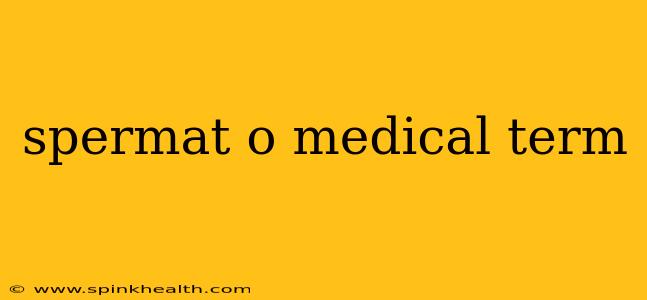Spermato- : Unraveling the Medical Term
The term "spermato-" is a combining form in medical terminology, meaning relating to or pertaining to sperm. It's a prefix that's frequently used to create more complex medical terms, often related to the male reproductive system and conditions affecting sperm. Let's dive deeper into understanding its usage and significance.
What does spermato- mean in medical terms?
The simple answer is sperm. More specifically, it refers to the male reproductive cell, the spermatozoon. Understanding this foundational meaning is key to deciphering terms using this prefix.
What are some examples of words using the prefix "spermato-?"
Several medical terms incorporate "spermato-," offering a glimpse into its diverse applications. These terms often describe aspects of sperm production, function, or related pathologies:
-
Spermatogenesis: This term refers to the process of sperm production in the testes. It's a complex biological process involving several stages of cell division and differentiation.
-
Spermatocytogenesis: This describes the specific phase of spermatogenesis where spermatocytes (precursor cells to sperm) are formed and undergo meiosis.
-
Spermatogonia: These are the diploid stem cells in the testes that give rise to sperm cells through mitosis and eventually meiosis.
-
Spermatocystic: Relating to or affecting the seminiferous tubules (where spermatogenesis occurs) within the testes.
-
Spermatocele: This is a cyst containing sperm that develops in the epididymis (a coiled tube attached to the testis that stores and transports sperm).
-
Spermatozoa: This is the plural form of spermatozoon—the mature male gamete, or sperm cell.
How is the prefix "spermato-" used in diagnoses?
The prefix is crucial in conveying precise information about a patient's condition. For example, a doctor might use terms like "spermatocytopenia" (low sperm count) or "oligospermia" (reduced number of sperm) to describe a male fertility issue. These terms immediately pinpoint the specific aspect of the reproductive system being affected.
Are there any other related prefixes or suffixes in medical terminology?
Yes, the medical field employs a rich vocabulary to describe the reproductive system. You might encounter terms with related prefixes and suffixes, such as:
-
Andro-: This prefix refers to the male sex or male reproductive organs. Terms like androgen (male hormone) or andropathy (male disease) exemplify its use.
-
-genesis: This suffix signifies the origin, formation, or production of something. Combined with other prefixes, it helps describe the production of various cells or substances.
-
-cyte: This suffix refers to a cell. For instance, spermatocyte is a type of cell involved in spermatogenesis.
What are some common conditions related to sperm?
Many conditions can affect sperm production, function, or morphology. These include, but are not limited to:
-
Infertility: Low sperm count, poor sperm motility (movement), or abnormal sperm morphology (shape) are common causes of male infertility.
-
Varicocele: An enlargement of the veins within the scrotum, which can impair sperm production.
-
Epididymitis: Inflammation of the epididymis, potentially affecting sperm transport and storage.
-
Genetic abnormalities: Chromosomal or genetic mutations can affect sperm production and quality.
Understanding the prefix "spermato-" empowers both medical professionals and patients to communicate accurately about the male reproductive system and related health conditions. This precision is vital for proper diagnosis and treatment.

